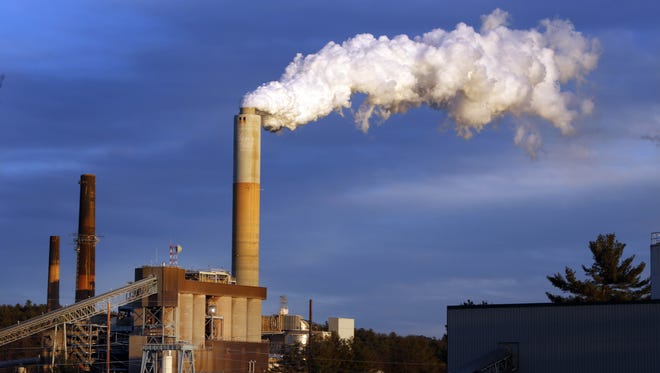Obama's Clean Power Plan gets court showdown
WASHINGTON -- The nation's second most powerful court spent nearly seven hours Tuesday trying to decide whether President Obama's signature plan to fight global warming represents a transformative environmental initiative or tramples on the prerogatives of Congress and the states.

In an extraordinary session before the full U.S. Court of Appeals for the District of Columbia Circuit, 16 lawyers representing the administration as well as states and power plants on both sides of the issue appealed to 10 judges whose ultimate decision almost certainly will be appealed to the Supreme Court. The final word on the Clean Power Plan may not come until 2018 or later, well into the administration of Obama's successor.
The key to the case focuses on the Environmental Protection Agency's claimed authority to issue regulations that will require some coal-fired plants to shut down or invest in natural gas, wind or solar power -- in essence, as one judge put it, to "subsidize their competitors."
The lengthy debate, while technical and at times inscrutable, pointed slightly in the government's favor for several reasons:
- Six of the 10 judges were named by Obama or his Democratic predecessor, Bill Clinton, and most sharply questioned state and industry opponents.
- One Republican appointee, Thomas Griffith, said the new rule calls for only minor reductions in coal-fired plant emissions.
- Another, Brett Kavanaugh, called the policy behind the plan "laudable," adding, "The earth is warming, and humans are contributing."
But Kavanaugh also led the questioning of Justice Department lawyers making the case for EPA Administrator Gina McCarthy, who attended the morning session along with a phalanx of agency officials.
"You're setting unachievable limits in an effort to drive those (plants) out of business," he told Justice Department lawyer Eric Hostetler. Unless Congress steps in, Kavanaugh said, "Lots of people are going to lose their jobs, lose their livelihoods."
The Clean Power Plan is a cornerstone of Obama's climate change initiative, now incorporated into the United Nations climate agreement. It aims to reduce carbon dioxide emissions from power plants 32% from 2005 levels over the next 15 years.
US likely to fall short of emissions goal
The appeals court, headed by Obama's stalled Supreme Court nominee, Merrick Garland, refused to block the plan in January while states and industry coalitions were mounting their appeal. But the Supreme Court issued a stay shortly before Justice Antonin Scalia's death in February.
In a sign of the issue's paramount importance -- to the environment, international relations, states, industries, Congress and the White House -- the appeals court decided to hear the case before all its judges rather than the usual three-judge panel. All, that is, except Garland, who is not participating in cases while his nomination is pending.
Tuesday's showdown just blocks from the U.S. Capitol lasted all day, with teams of lawyers arguing five separate issues. "This is a huge case," Kavanaugh said at one point. Added Griffith: "It was on NPR this morning -- it's big news."
Hostetler, one of four Justice Department lawyers participating in the oral argument, called global warming "the most urgent environmental threat our nation has ever faced."
Rather than question the gravity of the problem, lawyers for 27 opposing states and fossil fuel industries responded that EPA's goals cannot be achieved in many states from West Virginia to Wyoming, and that the Clean Air Act does not give the agency the authority held by Congress.
"We can't tell a coal plant, 'You have to become a solar plant,'" Peter Keisler, a lawyer representing industry opponents, said. "EPA has no authority to impose a system like this one, which requires, in order to stay open, that the owner invests in other facilities."
But several of Obama's nominees to the court questioned that argument. Judge Nina Pillard said regulations commonly require one industry subsidizing another -- in this case, polluting coal plants subsidizing renewable energy. Judge Patricia Millett said many coal plants could improve their technology at their current sites rather than paying for clean energy elsewhere.